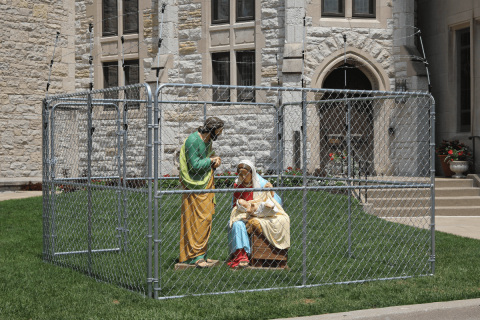
Underneath the tinsel and holly, Christmas is a story about an unwed mother, violent occupation, refugees, and lots of holy subversion about what "God with us" really means. These articles show how.
A Palestinian reflection on entering the season of Advent.
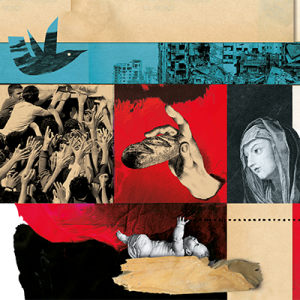
FOR THE THIRD year in a row, Advent in Palestine is not a season of joy. Even with the tenuous ceasefire, Advent is lived in the shadow of genocide, walls, checkpoints, ethnic cleansing, dispossession, and fear.
For many Palestinians, these days of waiting and preparation are overshadowed by mourning for loved ones lost, for homes demolished, for lands taken. In Bethlehem itself, where the Christian story began, streets that should be filled with song and light are burdened with grief and lament. The hymns of waiting mingle with the cries of the bereaved, displaced, imprisoned, and the starving.
In the land where the gospel of Jesus first unfolded, the nearness of Advent is most real. The Christmas story doesn’t look like comfort, plenty, and “toys in every store.” The original narrative bears a much closer resemblance to the times in which we, Palestinians, currently live.
The Nativity is a nexus of spiritual power in more ways than one.

I’VE HEARD A very old story about Christmas: When Adam and Eve were in the garden, they often sang with the angels, the most perfect sound ever created. When they were banished, the song fractured. Neither choir—human nor angelic—could sing perfect praises to the Creator of the universe alone.
On Christmas, however, a miracle occurs. The heavenly hosts reunite with mortal shepherds—the band is back together, the choir again complete. At least for a day, heaven and earth are reconciled in song.
Why is this memory of the Nativity important for us now?
Jesus’ birth was an event destined to radically transform the earth with the kingdom of God.
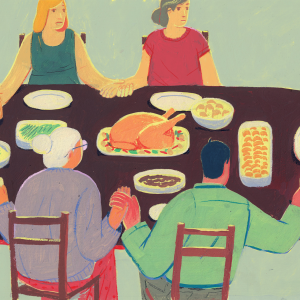
FOR SOME OF US, the Thanksgiving and Christmas holidays may be the only time all year that we see some of our relatives. Some probably harbor anxiety or even dread at the difficult conversations on politics and faith that surface during meals with family members who see the world very differently than you do.
In Advent, our thoughts turn to the meaning of Christ’s coming and the deep significance of the season for followers of Jesus—“waiting” for him to come, which has special and poignant meaning for us in the deep political and moral crisis in which we find ourselves. In many ways Advent is my favorite liturgical season, because it demands of Christians that we do the work of preparing our hearts for what it means that God came and lived as one of us in a world that needed (and needs) to be changed.
Advent reminds us that even the God of the universe sought asylum in the wake of violent oppression.
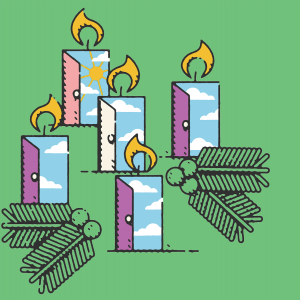
I SIT IN one of our robin’s-egg blue chairs on our front porch, one of my favorite places on earth. It has been a haven of peace, a slice of paradise amid the pandemic. It is dark. And late. And chilly. No one is around. Looking up between two branches of our mature red maple, I can see at least one star twinkling.
My mind’s eye turns to the stars in the desert. I dream of laying down, blanketed by the desert night, and staring up at the Milky Way in a reverie of wonder. Suddenly my thoughts shift to the shepherds on the night of Jesus’ birth who were minding their own business and about to turn in for the night. I imagine them comforted by the constant companionship of their night lights—the stars—and their sheep, whose bleating lulled them to sleep in the wilderness.
On this night—and really all throughout the year—I cannot stop thinking about how a mass choir of angels unexpectedly appeared to the shepherds to announce Jesus’ birth. Advent. Why appear to those looked down upon as poor societal nobodies? Why parade through and light up the night sky in concert for those the world deems to have little to no worth? Who would believe their testimony anyway?
Advent is a time to answer the question, "Which side are you on?"
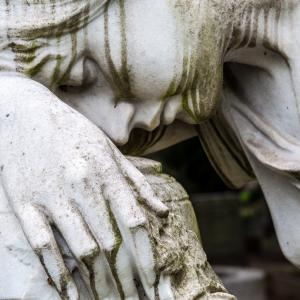
WHEN JOHANNES BRAHMS first played his German Requiem in Vienna in 1867, the audience was shocked. In fact, scholars report that some “hissed and booed and behaved quite boorishly.”
This October, when the St. Louis Symphony performed the same piece along with German composer Detlev Glanert’s arrangement of Brahms’ Four Preludes and Serious Songs, it elicited a similar response.
Not to the work itself, but to what occurred during intermission.
As conductor Markus Stenz took the stage, two audience members began to sing. In strong, clear voices, they performed Florence Patton Reece’s famous justice hymn: “Which side are you on, friend? Which side are you on?” Nearly a dozen more scattered throughout Powell Hall joined in. While the audience watched in stunned silence, a banner unfurled from the balcony with a silhouette of a man’s face. It said: Requiem for Mike Brown 1996-2014.
As in Vienna, there were some boos from the audience and a few expletives—more disruption following the Aug. 9 shooting death of Michael Brown, an unarmed African-American teenager, by white police officer Darren Wilson. While the Vienna audience complained that Brahms’ music was too religious for a secular setting, one St. Louis symphony-goer asked, “Is Powell Hall a proper venue for a protest?” And a Catholic priest challenged: “Instead of chanting ‘Which side are you on?’ further dividing the community, try singing ‘How can we heal?’”
Revenge fantasies, however justified they may feel, are not the same as God's righteous anger.

The falsehoods are so thick, the hypocrisies so outrageous, the corruption so rife, the processes so broken that you don’t know if you trust anyone anymore. The vulnerable are mocked or torn from their parents’ arms. Men in expensive suits say “Lord, Lord,” like they own air and mineral rights to the Most High. But their God, the one you thought—if but reluctantly—that you shared, is no god you recognize.
How can the pieces ever be put back together, the damage undone? What is gospel truth now?
A knot of self-righteous rage, tangled inextricably with despair, owns your gut. The accusing thought comes that you’re complicit. You’ve not done enough; you’ve saved no one. Guilt is the final straw. A voice not quite your own yet completely your own snarls: “Burn. It. Down.”
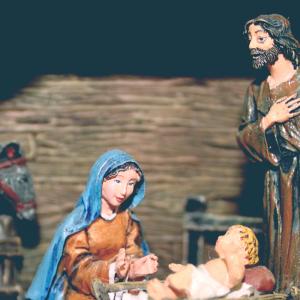
LAST DECEMBER, my daughter, Zipporah—who has taken to acting out the Christmas story using our wooden nativity set—observed that our crèche was missing a “mean king” figurine. That got me to thinking: I have never seen a nativity set with a King Herod figure.
We tend to close the curtains and go home for a family dinner right after the Magi bow before Jesus with their gifts of gold, frankincense, and myrrh.
But after the Magi head home, Joseph is warned in a dream to escape Herod’s genocidal tyranny by fleeing to Egypt with his wife and child.
Advent is a season of journeys- dangerous and otherwise.

THE FAMILIES arriving at the Sacred Heart Humanitarian Respite Center in McAllen, Texas, all come with one thing in common—a high sense of hope and faith in God. Much like the Holy Family, these families were forced to flee because they feared for the lives of their children.
Catholic Charities of the Rio Grande Valley began a humanitarian crisis-relief program in the summer of 2014 to respond to the influx of immigrants crossing the border who didn’t have a place to rest. Many are fleeing the violence in Central America. In El Salvador, for example, the murder rate has more than doubled since 2012 and soon will pass that of Honduras, which has the highest murder rate per capita in the world.
With the help of Sacred Heart Catholic Church and hundreds of volunteers, we were able to open a place of safety for refugees before they continue on their journey. For these holy families, it is the love for their children that moves them to face all possible dangers by traveling north.
In the biblical story, St. Joseph was a “just man” and faithful. He was forewarned of Herod’s imperial violence and fled the country to protect his wife and infant son. At our center the fathers are also men of profound dedication and attentiveness to the needs of their families.
One young dad had left his home in Central America with his pregnant wife and their two little girls. His wife gave birth in Mexico. As they prepared to cross the Rio Grande into the U.S., he and the baby became separated from his wife and two daughters. He lost them. When he and the 1-month-old baby arrived at our center, he had no idea if his wife and two little girls were alive or if he would ever see them again.

The 1992 classic is full of wonders you can’t find anywhere else: Michael Caine starring in a children’s movie, a ghost of Christmas future that haunts me every time I consider splurging on frivolities, and a drum set at a Victorian England Christmas party. But the movie isn’t just a fun, Muppet-y take on Charles Dickens’ classic novella; it’s also a compelling screenplay with heart-warming, humorous songs that offer a radical Christmas message of “cast down the mighty … send the rich away empty.”
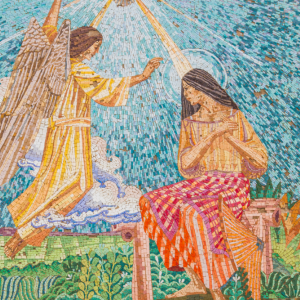
As I observed and engaged in the multifaceted conversations about abortion, I came to a stark realization: In the story of the Annunciation, God reveals the importance of consent, agency, and women’s rights. This season of Advent presents us with the perfect opportunity to look at the Annunciation from this perspective.